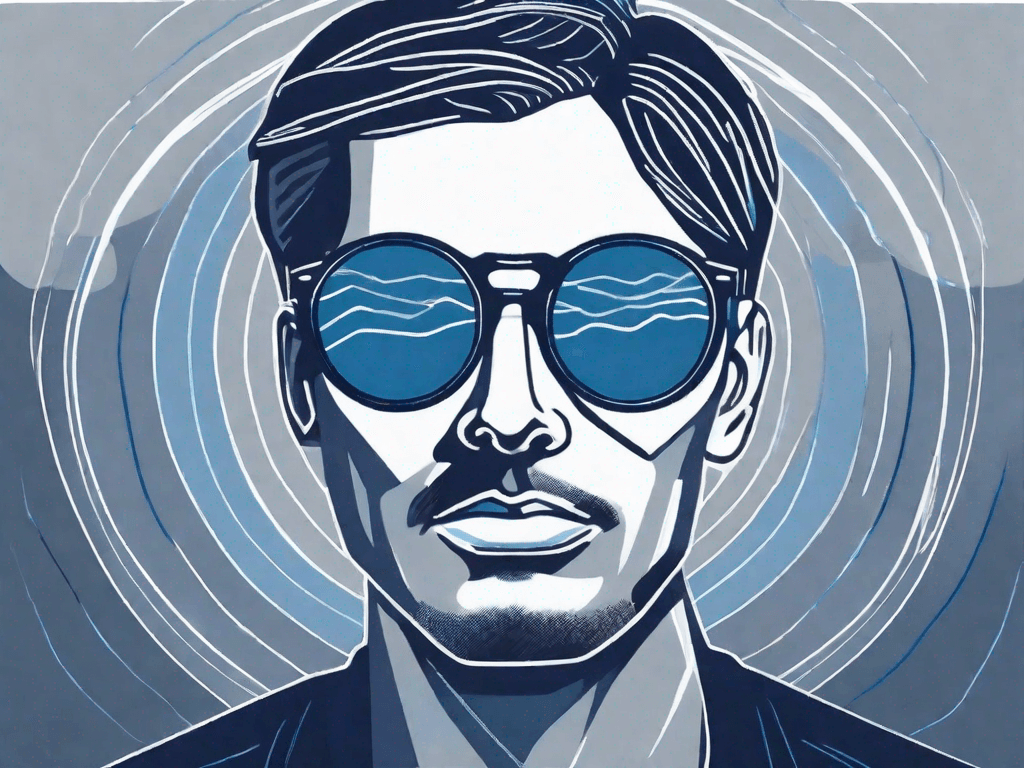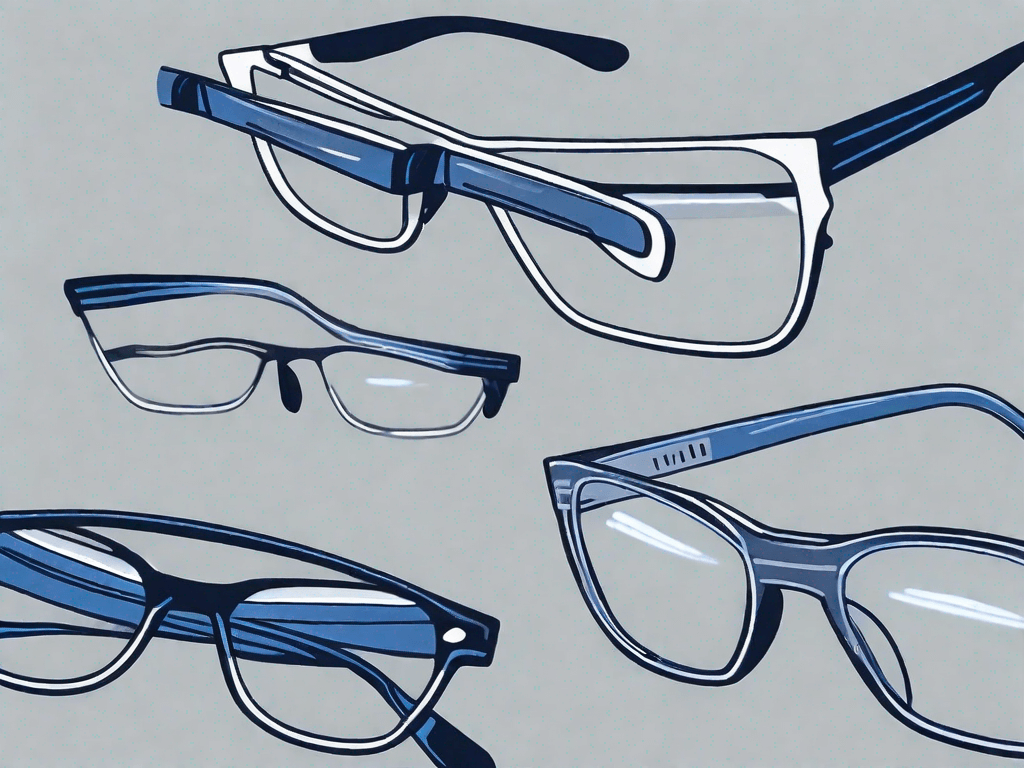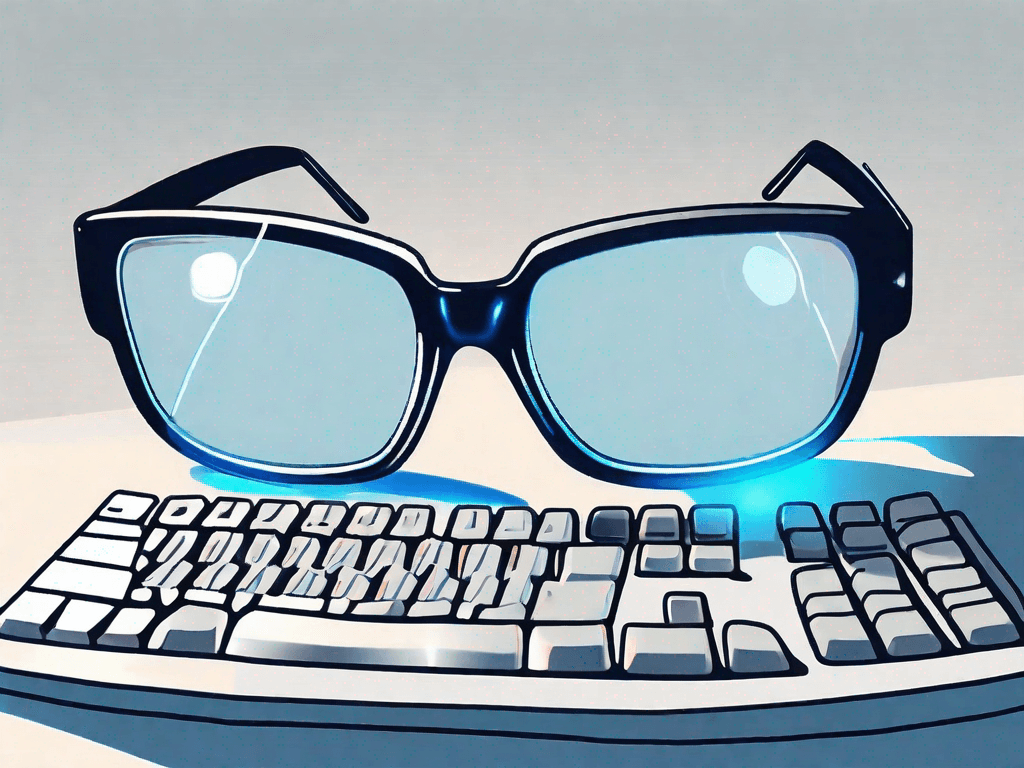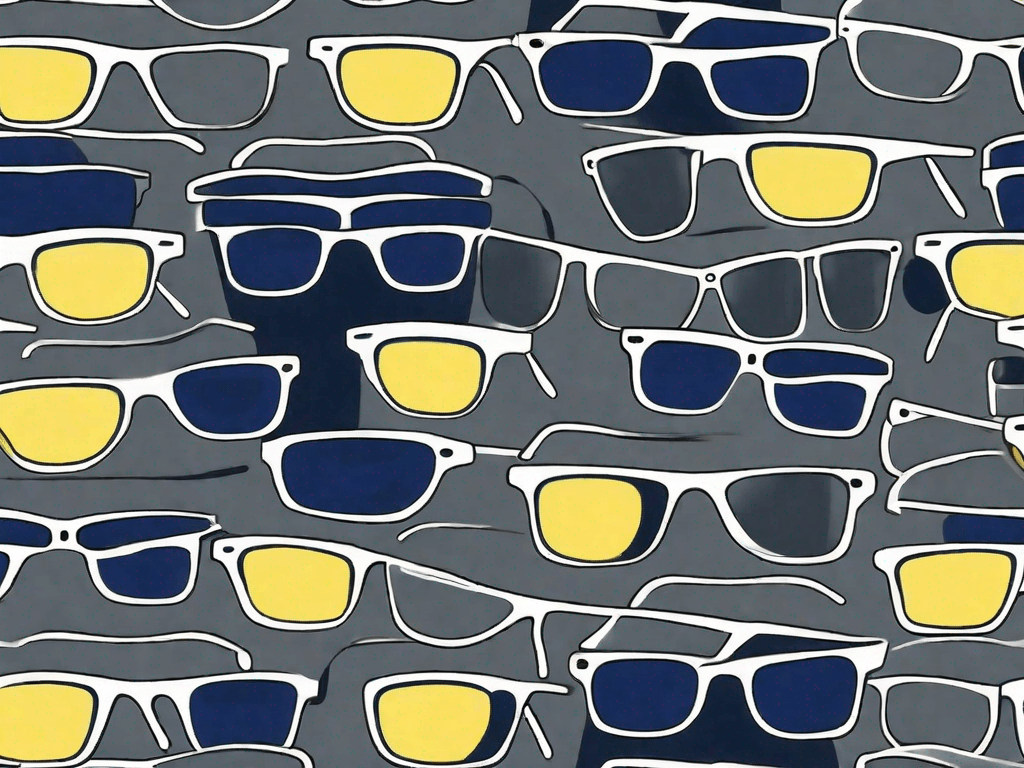What Is UV and Blue Light Protection Glasses?
UV and Blue Light Protection Glasses have gained popularity in recent years due to increased awareness about the harmful effects of ultraviolet (UV) and blue light on our eyes. These glasses are designed to block or reduce the amount of UV and blue light that reaches our eyes, providing additional protection and reducing the potential health risks associated with prolonged exposure. In this article we'll cover what is UV and blue light protection glasses and understanding the basics of UV and blue light.
Understanding the Basics of UV and Blue Light
When it comes to protecting our eyes and skin, it's important to understand the basics of UV and blue light. Let's dive deeper into these two types of light and their effects on our health.
Defining UV Light
UV light, or ultraviolet light, is a type of electromagnetic radiation that is not visible to the human eye. It is classified into three categories: UVA, UVB, and UVC. Each category has different wavelengths and levels of damage to our eyes and skin.
Starting with UVA, it has the longest wavelength among the three and is the least damaging to our eyes and skin. However, that doesn't mean it's completely harmless. Prolonged exposure to UVA rays can still lead to various eye conditions, including cataracts, macular degeneration, and photokeratitis, which is essentially a sunburn of the eye.
On the other hand, UVB and UVC have shorter wavelengths and can cause more harm. UVB rays are responsible for sunburns and are a major contributor to skin cancer. They can also damage the cornea and lens of the eye, leading to vision problems. UVC rays, fortunately, are absorbed by the Earth's atmosphere and do not reach us.
It's important to note that UV radiation is present year-round, even on cloudy days. So, protecting ourselves from UV rays should be a priority regardless of the weather conditions.
The Science Behind Blue Light
Now, let's shift our focus to blue light. Blue light is a high-energy visible (HEV) light with a shorter wavelength and higher frequency than other visible light colors. It is emitted by both natural and artificial sources, such as the sun, fluorescent lights, LED screens, and electronic devices.
While blue light is essential for regulating our sleep-wake cycle and mood, excessive exposure can have adverse effects on our eyes and overall well-being. Our eyes are not very good at blocking blue light, and prolonged exposure can strain them, leading to symptoms like eye fatigue, dryness, and blurred vision.
Moreover, studies suggest that excessive exposure to blue light, especially at night, can disrupt our sleep patterns. The blue light emitted by electronic devices can suppress the production of melatonin, a hormone that regulates sleep. This can make it harder for us to fall asleep and negatively impact the quality of our sleep.
Furthermore, there is growing concern that prolonged exposure to blue light may contribute to the development of age-related macular degeneration (AMD). AMD is a leading cause of vision loss in older adults, and while the exact relationship between blue light and AMD is still being studied, it's important to be mindful of our exposure to this type of light.
To protect ourselves from the potential harmful effects of blue light, we can make use of blue light filters on our devices, limit screen time before bed, and consider wearing blue light-blocking glasses.
Understanding the basics of UV and blue light is crucial for taking care of our eyes and overall health. By being aware of the potential risks and implementing preventive measures, we can enjoy the benefits of these lights while minimizing their negative impact.
The Importance of Protecting Your Eyes
Our eyes are not only the windows to our soul but also essential for our daily functioning. It is crucial to prioritize eye health and take necessary measures to protect them from potential harm. One of the significant threats to our eyes is the harmful ultraviolet (UV) radiation present in sunlight.
Potential Harm of UV Light to the Eyes
UV rays can cause more than just a sun-kissed tan. Prolonged exposure to UV radiation can have both short-term and long-term effects on our eyes. When our eyes are exposed to excessive UV rays, it can lead to a condition known as photokeratitis. This sunburn-like effect affects the cornea and can cause pain, redness, and temporary vision impairment.
However, the consequences of long-term UV exposure are even more alarming. Studies have shown that extended periods of UV radiation increase the risk of developing cataracts. Cataracts are characterized by the clouding of the eye's natural lens, resulting in blurred vision and, if left untreated, significant vision loss. Protecting our eyes from UV rays is crucial in preventing the development of cataracts.
Additionally, UV radiation has also been linked to the formation of pterygium. This growth affects the conjunctiva, the thin clear tissue that covers the white part of the eye, and can cause discomfort and visual disturbances. Pterygium can alter the shape of the cornea, leading to astigmatism and other vision problems.
The Impact of Blue Light on Vision
In today's digital age, we are constantly exposed to screens emitting blue light. This excessive exposure can have adverse effects on our vision and overall eye health. One common consequence of prolonged screen time is digital eye strain, also known as computer vision syndrome.
When we spend long hours in front of digital devices, such as computers, smartphones, and tablets, our eyes can experience dryness, blurred vision, eyestrain, headaches, and even neck or shoulder pain. The blue light emitted by these devices can cause our eyes to work harder, leading to fatigue and discomfort.
Moreover, the blue light exposure from screens can disrupt our natural sleep-wake cycle. The artificial light can suppress the production of melatonin, a hormone that regulates sleep. This interference can make it harder to fall asleep and negatively impact the overall quality of our sleep.
Furthermore, research suggests that long-term exposure to blue light may contribute to the development of age-related macular degeneration (AMD). AMD affects the central part of the retina, called the macula, which is responsible for sharp, central vision. Over time, AMD can lead to irreversible vision loss and significantly impact our daily lives.
Given the potential harm of blue light, it is essential to take proactive steps to protect our eyes. This includes limiting screen time, using blue light filters or glasses, and ensuring proper lighting and ergonomics when using digital devices.
In conclusion, protecting our eyes from UV radiation and blue light is crucial for maintaining good eye health. By being aware of the potential harm and taking preventive measures, we can safeguard our vision and enjoy a lifetime of clear and comfortable eyesight.
How UV and Blue Light Protection Glasses Work
The Role of UV Protection
UV protection glasses use special lenses that block or filter out harmful UV rays. These lenses are coated with a UV-blocking substance, which prevents UV radiation from reaching the eyes. By wearing UV protection glasses, you can significantly reduce the amount of UV light that enters your eyes and minimize the associated health risks.
UV rays are a type of electromagnetic radiation that comes from the sun. They are classified into three types: UVA, UVB, and UVC. UVA rays have the longest wavelength and can penetrate deep into the skin and eyes. UVB rays have a shorter wavelength and are responsible for causing sunburns. UVC rays have the shortest wavelength and are mostly absorbed by the Earth's atmosphere.
Exposure to UV rays can have various harmful effects on the eyes. It can lead to conditions such as cataracts, macular degeneration, and photokeratitis (sunburn of the cornea). UV protection glasses act as a shield, blocking these harmful rays and reducing the risk of eye damage.
The UV-blocking substance on the lenses of these glasses works by absorbing or reflecting the UV rays. This substance is often a special coating that is applied to the lens surface. It acts as a barrier, preventing the UV radiation from passing through and reaching the eyes.
It is important to note that UV protection glasses should provide 100% UV protection. This means that they block both UVA and UVB rays. When purchasing UV protection glasses, look for labels or markings indicating their UV protection level.
Mechanism of Blue Light Blocking
Blue light blocking glasses employ lenses that have a specialized coating or filter to selectively block or absorb blue light from entering the eyes. This filtering technology allows beneficial blue light to pass through while reducing the amount of potentially harmful blue light that reaches the eyes.
Blue light is a high-energy visible light that is emitted by various sources, including digital screens, LED lights, and the sun. It has a shorter wavelength and higher energy compared to other colors in the visible light spectrum. While blue light is naturally present in sunlight and has some beneficial effects on our health, excessive exposure to artificial blue light can have negative consequences.
One of the main concerns associated with blue light is its impact on sleep patterns. Blue light exposure, especially in the evening or at night, can suppress the production of melatonin, a hormone that regulates sleep. This can disrupt the sleep-wake cycle and lead to sleep problems.
Blue light blocking glasses help mitigate the potential negative effects of blue light on sleep and eye health. The specialized coating or filter on the lenses of these glasses blocks or absorbs a significant portion of the blue light, reducing its intensity before it reaches the eyes.
By wearing blue light blocking glasses, you can minimize digital eye strain symptoms, such as eye fatigue, dryness, and blurred vision, that are often experienced after prolonged use of digital devices. These glasses can also help protect the retina from potential long-term damage caused by excessive blue light exposure.
It is worth noting that not all blue light is harmful. Blue light from the sun, for example, plays a crucial role in regulating our circadian rhythm and promoting alertness during the day. Blue light blocking glasses are designed to selectively filter out the harmful blue light emitted by artificial sources while allowing the beneficial blue light from natural sources to pass through.
When choosing blue light blocking glasses, consider the level of blue light protection they provide. Some glasses offer higher levels of blue light filtration, while others provide a more moderate level. The choice depends on your specific needs and the amount of blue light exposure you typically experience.
Types of UV and Blue Light Protection Glasses
When it comes to protecting our eyes from harmful UV and blue light, there are different types of glasses available in the market. Let's explore some of these options in detail:
Standard UV Protection Glasses
Standard UV protection glasses are designed to block UVA and UVB rays, which are known to be harmful to our eyes. These glasses are widely available and commonly used as an essential form of eye protection against harmful UV radiation.
With their ability to block both UVA and UVB rays, these glasses provide a good level of UV protection, making them suitable for various outdoor activities. Whether you are going for a hike, playing sports, or simply enjoying a day at the beach, wearing standard UV protection glasses can help shield your eyes from the damaging effects of the sun's rays.
Moreover, these glasses come in a wide range of styles and designs, allowing you to find a pair that suits your personal taste and fashion preferences. From classic aviators to trendy oversized frames, you can find the perfect pair that not only protects your eyes but also complements your style.
Advanced Blue Light Blocking Glasses
In today's digital age, we are constantly exposed to blue light emitted by electronic devices such as computers, smartphones, and tablets. This prolonged exposure to blue light can have negative effects on our eyes and overall well-being. To combat this, advanced blue light blocking glasses have been developed.
Advanced blue light blocking glasses not only provide UV protection but also offer enhanced filtering of blue light. These glasses use special lenses that target a specific range of blue light wavelengths, primarily those emitted by digital devices. By reducing the amount of blue light that reaches our eyes, these glasses help minimize eye strain, fatigue, and potential long-term damage caused by excessive blue light exposure.
These glasses are particularly useful for individuals who spend long hours working on computers or using electronic devices. Whether you are a student, a professional, or someone who simply enjoys spending time on their devices, wearing advanced blue light blocking glasses can make a significant difference in protecting your eyes and maintaining visual comfort.
Similar to standard UV protection glasses, advanced blue light blocking glasses also come in various styles and designs. You can choose from a range of frames that suit your personal style and ensure that you not only protect your eyes but also look fashionable while doing so.
In conclusion, whether you opt for standard UV protection glasses or advanced blue light blocking glasses, investing in eyewear that offers UV and blue light protection is crucial for maintaining good eye health. So, next time you step out in the sun or sit down to work on your computer, make sure to put on a pair of glasses that shield your eyes from harmful rays and help you enjoy optimal visual comfort.
Choosing the Right UV and Blue Light Protection Glasses
Factors to Consider When Buying
When selecting UV and blue light protection glasses, it's essential to consider factors such as the level of UV and blue light protection provided, lens quality, fit and comfort, and lifestyle needs. Look for glasses that offer adequate coverage and ensure they have a close fit to prevent UV rays and blue light from entering through the sides.
Understanding Lens Ratings and Certifications
When buying UV protection glasses, look for lenses that offer 100% UV protection or are labeled with a UV400 rating. For blue light blocking glasses, consider lenses with a blue light blocking percentage of at least 30% to provide significant protection against harmful blue light.
Care and Maintenance of Protection Glasses
Cleaning Your Glasses
Proper cleaning is essential to maintain the clarity and effectiveness of UV and blue light protection glasses. Use a microfiber cloth and lens cleaner to gently remove smudges and dirt from the lenses. Avoid using harsh chemicals or abrasive materials that may scratch or damage the lens coatings.
Proper Storage and Handling
Protect your glasses by storing them in a clean, dry case when not in use. Avoid leaving them in extreme temperatures or exposing them to direct sunlight for extended periods. Handle your glasses with clean hands to prevent transferring oils and dirt onto the lenses.
Common Myths and Misconceptions about UV and Blue Light Glasses
Debunking Blue Light Glasses Myths
There are misconceptions surrounding blue light glasses, such as the belief that they are only necessary for individuals who use computers extensively or that blue light is entirely harmful. In reality, blue light is present in natural sunlight and emitted by various electronic devices, making protection beneficial for everyone.
Unraveling Truths about UV Protection Glasses
Some people mistakenly assume that UV protection glasses are only necessary on sunny days or during specific outdoor activities. However, UV rays are present year-round, even on cloudy days, and can reflect off surfaces like water, snow, and sand, intensifying exposure. Wearing UV protection glasses consistently is crucial for maintaining long-term eye health.
UV and blue light protection glasses offer valuable benefits in safeguarding our eyes from potential harmful effects. By understanding the basics of UV and blue light, recognizing the importance of eye protection, and selecting suitable glasses based on individual needs, we can take proactive steps to maintain our eye health and minimize the risks associated with prolonged UV and blue light exposure.





